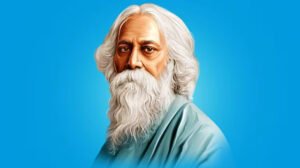**Rabindranath Tagore**
**Born**: 1861
**Died**: 1941
Rabindranath Tagore, revered as the "World Poet," was an unparalleled genius in literature. In 1913, he became the first Asian to be awarded the Nobel Prize in Literature. The citation accompanying his award read:
*"For his profoundly sensitive, fresh and beautiful verse, by which, with consummate skill, he has made his poetic thought, expressed in his own English words, a part of the literature of the West."*
Tagore was born on May 7, 1861, in Jorasanko, a prominent neighborhood in Kolkata, into a renowned family. His father was Maharshi Debendranath Tagore, and his mother, Sarada Devi.
### Childhood Memories
Tagore's childhood was both ordinary and extraordinary, shaped by routine studies and an ever-curious mind. As described in his own words:
*"The bell struck seven in the morning. Master Nilkamal's clock was always precise—never a minute's deviation. With a frail, wiry frame, his energy was as robust as his students’. Every day, I sat with my books and slate before the table. Lines of arithmetic would appear on the blackboard, all written in Bengali—geometry, algebra, arithmetic, and then literature, from Sita's exile to Meghnad Badh Kavya. Alongside came natural sciences, sometimes explained by Sitanath Dutt, whose lectures on experiments sparked fleeting glimpses of science."*
Though his formal education began early, Tagore disliked the burden of textbooks. His heart yearned for the beauty of the natural world and the simplicity of human life around him. From the verandah, he observed with fascination the old tailor bent over his work, the bearded Chandra Bhan grooming himself, or the stable dog chasing crows pecking at spilled grains.
Tagore’s childhood curiosity led to small experiments, such as planting custard apple seeds in a dusty corner of the verandah. He eagerly awaited the first sprout, only to find the seeds swept away by the same broom that had once collected the dust.
### Daily Life and Growing Years
The sounds of street vendors—selling raw mangoes and utensils—mingled with the distant laughter of children playing games, while the sights of housemaids drying wet hair in the sun painted vivid memories. Each moment seemed rich with life and detail, even as his day ended with gymnastics lessons and art sessions.
As dusk fell and the oil lamp lit his study room, young Tagore grappled with English lessons under the guidance of Aghore Babu. Sleepy and dreamy, he often found himself caught between the real and the imagined, where shadows seemed to transform into mystical forms.
### A Child Forever
Despite stepping into the wider world, Tagore always retained the curious heart of a child. It was this eternal youthfulness of spirit that allowed him to create timeless stories such as *Postmaster*, *Ramkanai’s Folly*, and *The Return of Khokababu*. Beneath his outer appearance—a flowing robe, a long beard, and eyes that seemed to peer into distant realms—Tagore remained the same boy, brimming with questions and wonder.
His ability to weave life’s simplest joys and deepest sorrows into words remains unparalleled. For this reason, Tagore will forever be celebrated, not just as a poet or writer, but as a symbol of the unending quest for beauty and truth in human existence.

